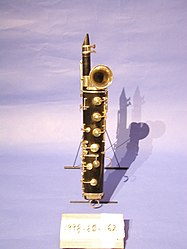Octavin
 | |
| Woodwind instrument | |
|---|---|
| Classification | Aerophone |
| Hornbostel–Sachs classification | 422.212 (Single reed instrument with irregular bore) |
| Inventor(s) | Julius Jehring |
| Developed | 19th century |
The octavin (also spelled oktavin)[1] is a 19th century woodwind instrument with a conical bore and a single reed.[2]
Design
The octavin resembles a saxophone: its range is similar to that of a soprano saxophone. However, the octavin differs in three respects: first, its conical bore has a smaller taper than that of a saxophone; second, its body is made of wood, rather than metal; third, its usual shape is more similar to that of a bassoon, having two parallel straight sections joined at the bottom, with the mouthpiece attached to the top of one section and a metal bell to the top of the other. A few straight octavins exist, having a wooden bell; in this configuration it resembles a tarogato but has a smaller taper.[3] The instrument was produced in B♭, C and F.[4][1] One writer (Altenberg) mentions a bass octavin but no such instrument is known to have been produced. The (written) range of the octavin is from G♯3 to G6.[3]
Production
The octavin was invented in 1881 by Julius Jehring, a bassoon maker.[3] It was later patented in 1893 by Oskar Adler and Hermann Jordan of Markneukirchen, Germany.[5]
Legacy
The octavin was a commercial failure and is now extremely rare, being considered a curiosity by collectors.[3][6] However, the octavin is memorialized by the organ stop bearing its name.[7] Repertoire for the instrument is scarce: one of the only pieces for the octavin is a sonatina composed by Jeff Britting (b. 1957).[3]
References
- ^ a b The New Grove dictionary of musical instruments. Stanley Sadie. London: Macmillan Press. 1984. ISBN 0-943818-05-2. OCLC 10754317.
{{cite book}}: CS1 maint: others (link) - ^ (Corp), Dorling Kindersley (2022). Music : the definitive visual history. London. ISBN 978-0-241-55902-4. OCLC 1314382566.
{{cite book}}: CS1 maint: location missing publisher (link) - ^ a b c d e Hartenberger, Aurelia (2021-10-28). "Octavin-Bb: 'Adler & Co.'". Hartenberger World Musical Instrument Collection. Retrieved 2023-01-07.
- ^ "Search Results". collections.ed.ac.uk. Retrieved 2023-01-07.
- ^ "Octavin". www.metmuseum.org. Retrieved 2023-01-07.
- ^ "422.212". Horniman Museum and Gardens. Retrieved 2023-01-07.
- ^ Scholes, Percy A. (1964). The concise Oxford dictionary of music. John Owen Ward (2d ed.). London: Oxford University Press. ISBN 0-19-311307-4. OCLC 509554.
- Carse, Adam (1939). Musical Wind Instruments. London: MacMillan.
- "Movie Music UK -- Composer Gallery A-B". Archived from the original on 2006-09-25. Retrieved 2006-09-26.
